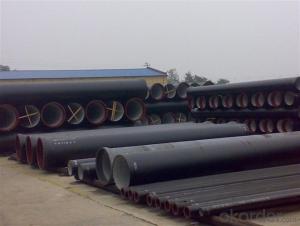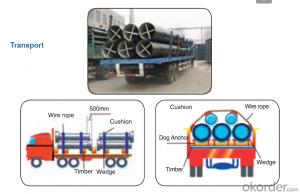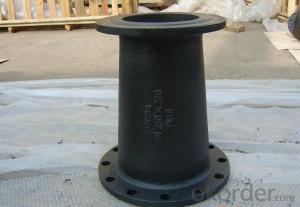Duct Iron Pipe DI Pipe ISO 2531 DN 80-2000mm K12
- Loading Port:
- Tianjin
- Payment Terms:
- TT OR LC
- Min Order Qty:
- 100 m
- Supply Capability:
- 100000 m/month
OKorder Service Pledge
OKorder Financial Service
You Might Also Like
Specification:
1. size : DN80-DN2000 available with PN16 or PN10 or PN25 flanges
2.Standard : ISO2531/EN545/EN598/AWWA standard
3. WRAS Potable Water FBE Internal Lining
4.Material : Ductile iron
5.Technical: Casting
6. Type: Socket / flange PN10 / PN16 / PN25
7. Length=6m, 5.8m
8. Coating: Fusion bonded epoxy to 300 microns Dry Film Thickness
Portland cement lining internally and zinc-rich paint with not less than 70 microns bitumen externally
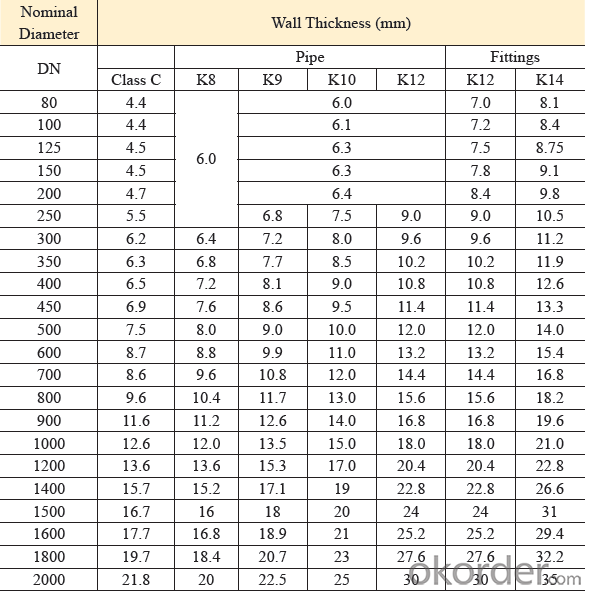
Quality:
ISO 2531 or EN 545 Standard K9 Class, K12 Class
1. ISO 9001 Certificate
2. ISO 2531 & EN 545 Certificate
3. WRAS Potable Water Certificate for FBE Internal Lining
4. WRAS EPDM Rubber Gasket or NBR Rubber Gasket
5. DN80mm - DN2000mm
6. Black Bitumen or Blue FBE / Epoxy Coating
7. Lengh = 6m or cut into 5.6m, 5.7m, 5.8m
8. Client's Brand Customization Allowable
9. Container or Bulk Loading / Shipping
10.Delivery within one Month or According to Client's Order Quantity
11. Support Client or The Third Party Inspection before Shipment
Standard Lining and Coating:
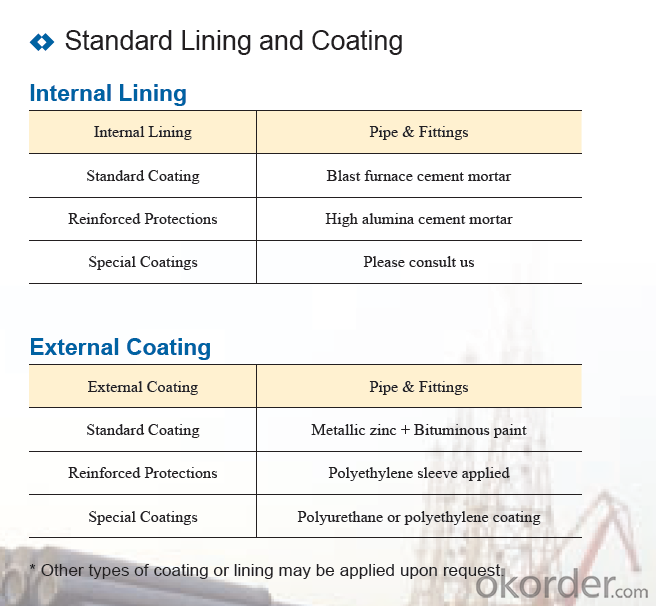
Transport:
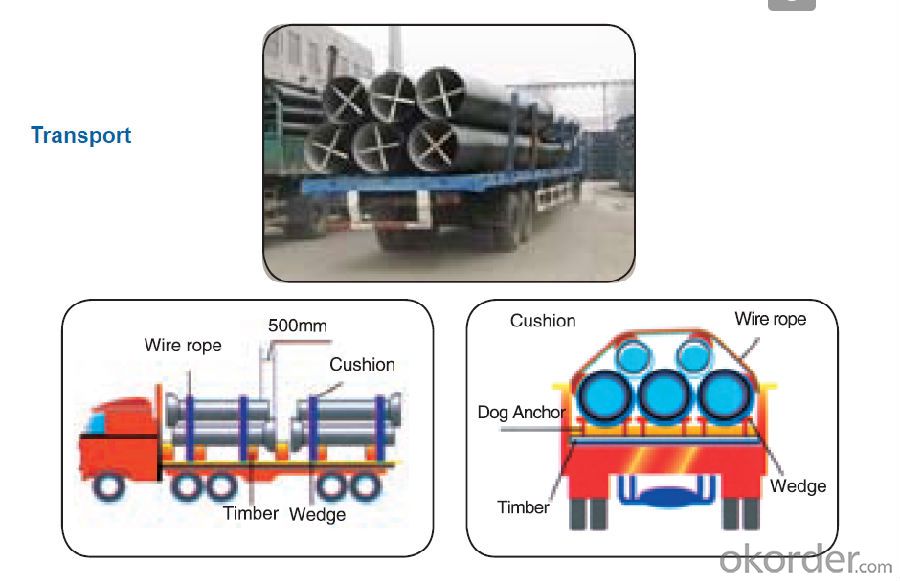
- Q:What is the process of fusion bonding for ductile iron pipes?
- Fusion bonding for ductile iron pipes is a process that involves heating the pipes to a specific temperature and then applying pressure to fuse the ends of two pipes together. This creates a strong and durable bond between the pipes, ensuring a leak-proof connection. The fusion bonding process is commonly used in the construction and maintenance of underground water and sewer systems.
- Q:What are the different lining materials available for ductile iron pipe?
- Ductile iron pipes have multiple options for lining materials, which serve to safeguard the pipes from corrosion and prolong their lifespan. Some commonly used lining materials are as follows: 1. Cement Mortar Lining: This lining comprises a layer of cement mortar applied to the inner surface of the pipe. It serves as a durable and smooth barrier against corrosion, making it a popular choice for water and wastewater applications. 2. Polyethylene Encasement: In this method, the pipe is wrapped with a layer of polyethylene film. This lining delivers excellent protection against corrosion and is frequently employed in aggressive soil conditions. 3. Polyurethane Lining: Polyurethane lining is a spray-applied substance that forms a seamless and flexible barrier within the pipe. It offers exceptional resistance to chemicals and abrasion, making it suitable for applications involving aggressive fluids. 4. Epoxy Lining: Epoxy lining is widely chosen for lining ductile iron pipes due to its outstanding resistance to corrosion and chemicals. It is typically applied as a liquid coating that cures to form a protective and smooth layer. 5. Zinc Coating: Zinc coating, also known as galvanizing, involves applying a layer of zinc to the external surface of the pipe. This lining provides corrosion resistance and is commonly utilized in outdoor and exposed applications. These diverse lining materials offer distinct advantages and are selected based on the specific requirements of the application. Factors such as the nature of the transported fluid, environmental conditions, and expected service life play a crucial role in determining the most suitable lining material for ductile iron pipes.
- Q:Can ductile iron pipes be used for pressure surge applications?
- Yes, ductile iron pipes can be used for pressure surge applications. Ductile iron is known for its high strength and durability, making it suitable for handling pressure surges caused by water hammer or other transient events. It has the ability to absorb and withstand these sudden pressure changes without experiencing significant damage or failure. However, proper design considerations and installation techniques should be followed to ensure the safe and effective use of ductile iron pipes in pressure surge applications.
- Q:What are the different sizes available for ductile iron pipes?
- Ductile iron pipes, also called DI pipes, come in a wide array of sizes to accommodate different needs and applications. The diameter of ductile iron pipes usually ranges from DN 80 (3 inches) to DN 2600 (104 inches), with varying wall thicknesses. For smaller diameters like DN 80 to DN 300, standard lengths of 5.5 meters or 6 meters are readily available for ductile iron pipes. As the diameter increases, the standard lengths may also increase, going up to 7 meters or even longer for larger sizes. Commonly used ductile iron pipe sizes include DN 80, DN 100, DN 150, DN 200, DN 250, DN 300, DN 350, DN 400, DN 450, DN 500, DN 600, DN 700, DN 800, DN 900, DN 1000, DN 1200, DN 1400, DN 1600, DN 1800, DN 2000, DN 2200, DN 2400, DN 2600, and more. It is important to note that the availability of different sizes may vary depending on the manufacturer and the specific region or country. Moreover, custom sizes can also be produced to meet specific project requirements. When selecting the appropriate ductile iron pipe size, it is crucial to consider factors like flow rate, pressure, and intended application to ensure optimal performance and durability. Seeking advice from industry experts or referring to relevant standards and guidelines can aid in determining the suitable size for a particular project.
- Q:It's not easy to drill ductile iron with cobalt high speed steel bit. Please help to point it out
- The material can be annealed and the process is simple, that is, heating the workpiece and cooling it naturally. In this way, the hardness of the workpiece can be reduced.
- Q:Can ductile iron pipe be used for desalination plants?
- Yes, ductile iron pipe can be used for desalination plants. Ductile iron has excellent corrosion resistance properties, making it suitable for handling the corrosive nature of desalinated water. Additionally, its high strength and durability make it a reliable choice for transporting water in such plants.
- Q:Can ductile iron pipes be used for irrigation systems?
- Yes, ductile iron pipes can be used for irrigation systems. Ductile iron pipes are commonly used in various applications, including water supply systems and irrigation systems. They are known for their strength, durability, and corrosion resistance, making them suitable for transporting water in irrigation systems.
- Q:Can ductile iron pipes be used for water supply networks?
- Yes, ductile iron pipes can be used for water supply networks. Ductile iron pipes are known for their strength and durability, making them suitable for carrying water over long distances. They are resistant to corrosion and can withstand high pressure and external loads, making them a reliable choice for water supply systems. Additionally, ductile iron pipes have a smooth internal surface, which reduces friction and allows for efficient water flow. Overall, ductile iron pipes have been widely used in water supply networks around the world due to their excellent performance and longevity.
- Q:Can ductile iron pipes be repaired if they get damaged?
- Yes, ductile iron pipes can be repaired if they get damaged. The repair process typically involves cutting out the damaged section and replacing it with a new pipe segment or using repair clamps to fix minor leaks or cracks.
- Q:Are ductile iron pipes suitable for potable water distribution systems?
- Yes, ductile iron pipes are suitable for potable water distribution systems. Ductile iron is a type of cast iron that is known for its high strength and durability, making it an excellent choice for conveying drinking water. These pipes are resistant to corrosion, which is essential for maintaining the quality and safety of potable water. Additionally, ductile iron pipes have a smooth interior surface, which helps to minimize the accumulation of sediments and biofilms that can affect water quality. They also have the ability to withstand high pressure and temperature changes, making them suitable for various potable water distribution systems. Overall, ductile iron pipes are a reliable and widely used option for ensuring the delivery of safe and clean drinking water to communities.
1. Manufacturer Overview |
|
|---|---|
| Location | |
| Year Established | |
| Annual Output Value | |
| Main Markets | |
| Company Certifications | |
2. Manufacturer Certificates |
|
|---|---|
| a) Certification Name | |
| Range | |
| Reference | |
| Validity Period | |
3. Manufacturer Capability |
|
|---|---|
| a)Trade Capacity | |
| Nearest Port | |
| Export Percentage | |
| No.of Employees in Trade Department | |
| Language Spoken: | |
| b)Factory Information | |
| Factory Size: | |
| No. of Production Lines | |
| Contract Manufacturing | |
| Product Price Range | |
Send your message to us
Duct Iron Pipe DI Pipe ISO 2531 DN 80-2000mm K12
- Loading Port:
- Tianjin
- Payment Terms:
- TT OR LC
- Min Order Qty:
- 100 m
- Supply Capability:
- 100000 m/month
OKorder Service Pledge
OKorder Financial Service
Similar products
New products
Hot products
Hot Searches
Related keywords

